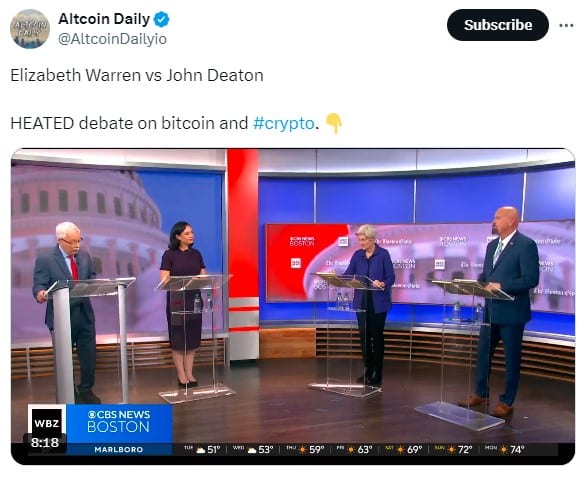With just weeks until the 2024 U.S. elections and many ballots already cast, cryptocurrency regulation emerged as a hot topic in the recent U.S. Senate debate between Senator Elizabeth Warren and her Republican challenger, attorney John Deaton.
Held on October 15 at WBZ-TV studios in Boston, the debate quickly escalated, with both candidates sharply criticizing each other. Deaton emphasized the stark difference in their positions on cryptocurrency, asserting that Warren’s approach stifles innovation.

The debate heated up as Deaton emphasized stark differences on crypto issues, arguing for regulation that promotes innovation. In contrast, Warren pushed for stricter oversight to protect consumers, spotlighting the national conversation about the future of digital currencies.
What does Senator Warren think about cryptocurrency?
Senator Warren expressed her concerns about the cryptocurrency industry, stating, “I want to build an Anticrypto Army to rein in what I call crypto threats to financial stability, consumer protection, climate, and national security.”
She believes that cryptocurrencies should adhere to the same regulations that banks and financial institutions follow to protect consumers and prevent illicit activities.
How does John Deaton respond to Warren’s stance?
Deaton challenged Warren’s approach, arguing that her regulatory efforts hurt everyday people. “When I found Bitcoin, I thought of my mom, who struggled with bank fees,” he recalled. “Bitcoin allows people to cut out predatory banks and helps the unbanked.”
He criticized Warren’s focus on crypto regulation while other pressing issues, like inflation and illegal immigration, remain unaddressed.
What is the issue with cryptocurrency regulations?
Deaton accused Warren of focusing too much on cryptocurrency, stating, “With inflation pricing regular people out of the economy and a debt crisis looming, why did she wake up one day and say she wants to build an anti-crypto army?”
He believes that Warren’s policies do not help the working class and have resulted in more harm than good.
What are Warren’s responses to Deaton’s critiques?
Warren countered by asserting, “I want to make sure that crypto has to follow the same rules as every bank.” She emphasized that her regulatory efforts aim to protect consumers and maintain fair practices in the financial system. “I fight for working people,” she added, indicating her commitment to addressing financial inequality.
Is there a conflict of interest in Deaton’s campaign?
A significant point of contention in the debate was the funding behind Deaton’s campaign. Warren claimed that 90% of his funding comes from the crypto industry, implying a conflict of interest. “If John Deaton has a chance to go to Washington, his crypto buddies are going to want a return on their investment,” she argued.
How does Deaton defend his stance?
Deaton responded by stating, “I’ve upset more crypto billionaires than anyone,” emphasizing his independence from the crypto industry’s influence.
He also pointed to his successful legal battles against the SEC, which he believes have been beneficial for small retail investors. “I sued the government because the SEC had done something really bad to small retail investors,” he said, highlighting his commitment to consumer advocacy.
What is the future of cryptocurrency regulation?
The debate raised important questions about the future of cryptocurrency regulation in the U.S. Warren and Deaton’s contrasting views suggest a deep divide on how to approach the growing digital currency landscape.
While Warren advocates for stringent regulations to protect consumers, Deaton argues for a more balanced approach that allows innovation without stifling access for everyday people.
As both candidates head into the election, the discourse surrounding cryptocurrency will likely remain a critical issue for voters. With a focus on financial fairness and consumer protection, the outcome of this debate could shape the future of cryptocurrency regulation in Massachusetts and beyond.
Also Read: Bitcoin Will Thrive, No Matter Who Wins US Elections: BlackRock CEO








